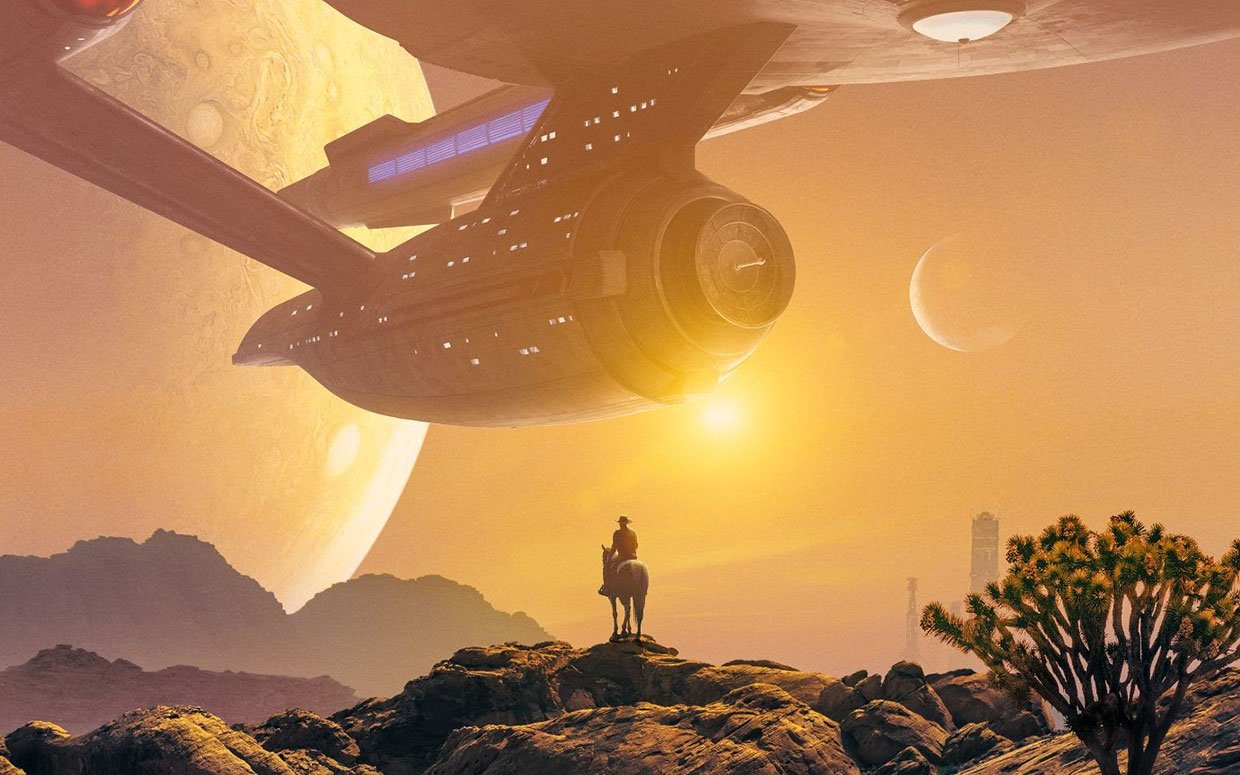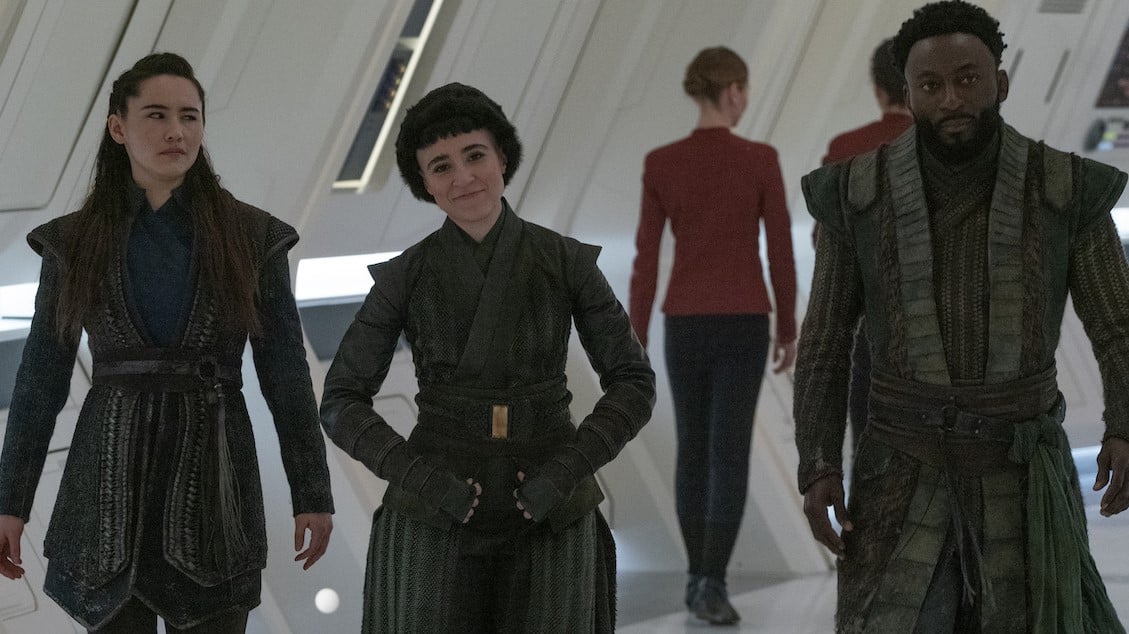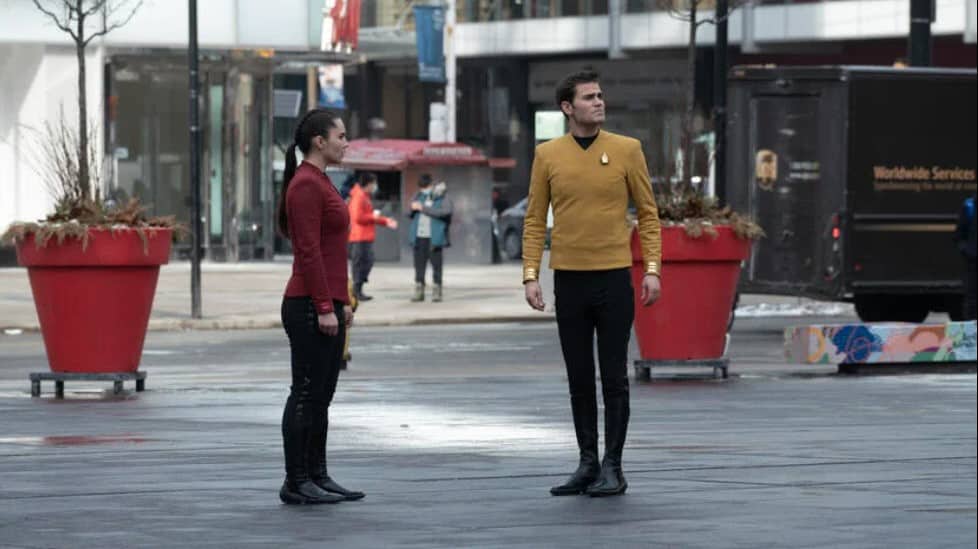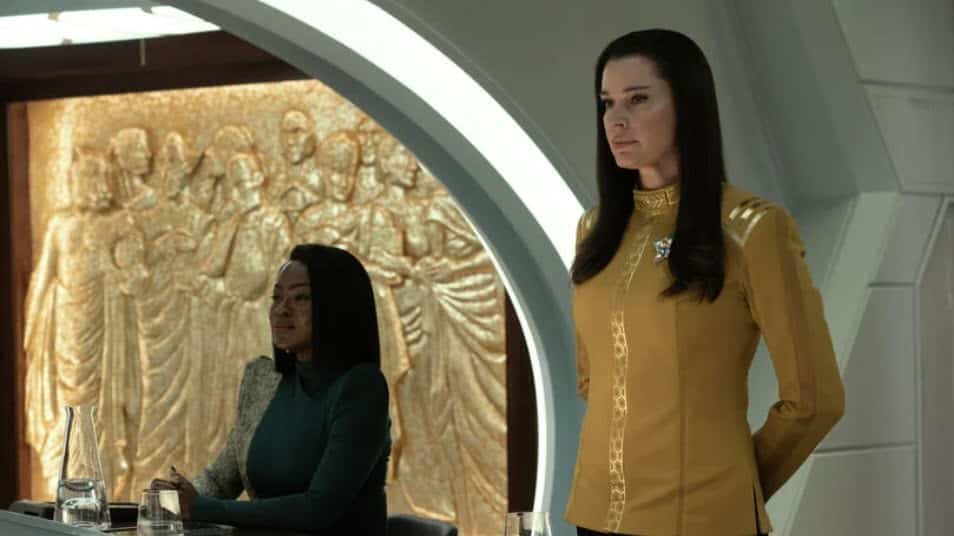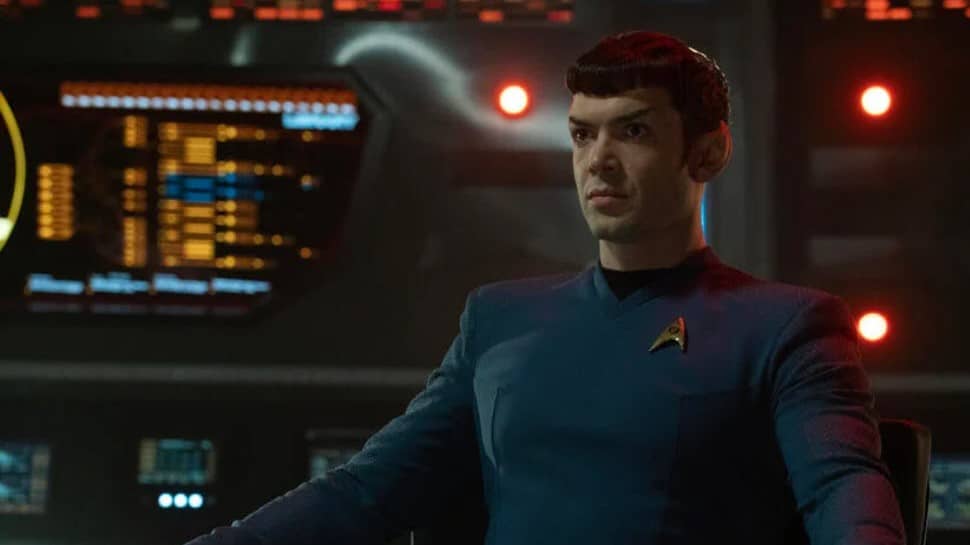Captain Pike and the crew of the USS Enterprise attempt a rescue after a first contact gone wrong, as part of their mission to explore “Strange New Worlds.” Written by Akiva Goldsman & Alex Kurtzman & Jenny Lumet, directed by Akiva Goldsman.
Mark Turetsky: Space… the final frontier. Here comes the story of the starship Enterprise. No bloody A-B-C or D. With Roddenberry’s original captain at the helm, Christopher Pike. Welcome to our coverage of Star Trek: Strange New Worlds, Will!
Will Nevin: Feels great to be here, Mark. And not only did we get Pike, but we got Robert “Bob” April, the first bloody captain of NCC-1701. Throw in the U.S.S. Archer, and we had enough Trek nuggets to sustain the nerdiest of nerds — and that was in the first 20 minutes. What an episode.
(Anson) Mount, His Head on a (Captain) Pike
Mark: First and foremost, though, we’re re-re-introduced to Anson Mount’s Christopher Pike. We last saw him in season 2 of Star Trek: Discovery, where he was still recovering from the events of 1966’s (or was it 1986’s?) “The Cage.” Over the course of that season, he had a vision of his future: paralyzed, disfigured and confined to a wheelchair, as in 1966’s “The Menagerie.” And now he’s got all the more reason to be haunted: he’s seen his future, and as he tells it, the man that he is now will be dead, replaced by a presence he doesn’t quite recognize as himself.

Will: Truth time: I checked in for the Disco pilot, hated it and never picked it back up. It was everything I hated about JJTrek, poorly written with thin characters and a plot that was dumb on its face. Has it gotten better? Maybe? Am I going to devote hours of my life to finding out? No.
That said, I walked into this not knowing a thing about Pike and the tie-in, other than that he appeared. As the episode unfolded, I was floored. Us Trek folks know how Pike’s story ends, and I assumed it would be an emotional burden on viewers as the series evolves. But to write that into the on-screen narrative? To tax the character in that way? What an amazing, complex choice.
Is it a perfect one? No, not quite. (Probably don’t want to talk about your visions of the future with the people just meeting you as an alien, skipper.) But this instantly makes Pike the most interesting character to sit in the captain’s chair in…well, a long time.
Mark: And isn’t it just the perfect excuse not to talk about it? Any time it comes up, whether it be to Admiral April or Captain Batel after a casual fling, he can just answer “It’s classified.” The only person he confides in is Spock, who independently deduces that he’s seen his own future. Spock figures out that something is wrong as soon as Pike tells the crew that he’ll make sure that nobody will die on the mission (definitely a weird thing to tell your crew). And it’s great (dramatically) that he’s still processing this news. He hasn’t even considered if ten years is a long time or not.
Will: They’re going to close the loop on this, right? Pike will eventually become the man we’ve known him as. And if can make peace with that — if he can realize that he can still live and be of value — that is some powerful statement against ableism. And a hell of a character arc.
Mark: The training accident is still 10 years out at this point, so we’ll see if that happens in Strange New Worlds or whatever Star Trek series or movie or what-have-you exists in 2032. It’s also somewhat thematically tied to this season of Picard, which outright stated repeatedly that humans are stuck reliving the traumas of the past. Here, it’s a man who’s haunted by a future trauma.
It’s interesting to me that the extended crewmember that this week’s episode spotlights is La’an Noonien-Singh, who’s dealing with her own past trauma (her family were captured by the Gorn, who did horrible things in front of young La’an’s eyes). Noonien-Singh has the air of someone who’s stared into an abyss that’s just as dark as what Pike’s witnessed, and I won’t say that she’s okay with it, but she’s a functional person. And it’s because of that trauma connection between them that Pike is able to save the day by the end of the episode.
Will: And as you suggested at the ComicsXF water cooler, this episode directly ties into the Picard finale as it rolls the Second American Civil War, the Eugenics Wars and World War III into one planet-killing catastrophe. Sure was something to see that “Audit the Vote” sign in Pike’s montage, wasn’t it? I hope we live through the hellfire just like Rios and his family did. Also, I watched with someone who immediately spotted what may be La’an’s problem with addiction, so that character has a lot of places to go and explore — many of which we haven’t seen in Trek.
Mark: It was definitely something of a gut punch, after coming off this past season of Picard, to see January 6th leading directly into World War III. I’ll bet that Russia hadn’t invaded Ukraine when this episode was filmed, or we would have seen some of that as well.
Will: I’d like to stop living through history, please.
Meet The New Crew, Same As The Old Crew
Mark: But since we’ve brought up La’an, let’s talk about the crew of this ship. It’s massive. We’ve got nine main cast members, enough so that we haven’t even met our chief engineer, Chief Hemmer (Bruce Horak), who is only seen coming aboard in a montage at the end of the episode. Add to that the promise of at least one recurring character in Samuel Kirk (Dan Jeannotte). Many of these characters are recastings from the original Star Trek: Uhura, Chapel, M’Benga, and of course, Spock and Una/Number One. What’d you think of the decision to have so much of the crew be made up of younger versions of characters from The Original Series (two of which were initially played by Majel Barrett)?

Will: I’ll be honest — quite a few of them felt like fan service appendages. Sure, Chapel and Uhura are given plenty of things to do and the cheeky exuberance in both performances are great, but those could have easily been new characters. As this series unfolds (and we bring on that other Kirk next season), it will need to justify why we have so many familiar names on the ship’s roster.
Mark: The thing I really appreciate about the crew is that each castmember brings a unique energy to the show thus far. You clocked Celia Rose Gooding’s Uhura and Jess Bush’s Chapel as both having a youthful exuberance, but they’re expressed in such different ways. And the little we saw of Melissa Navia’s Lt. Ortegas or Babs Olusanmokun’s Dr. M’Benga promises that they both bring a certain charisma to their roles. We’ve had hotshot pilots in the franchise before (Tom Paris being the main example), but Navia seems like she might outshine McNeill in that department.
Because when you get right down to it, this episode, as a statement of intent, establishes that they’re getting back to Trek basics. A mix of tones, episodic adventures with continual character development. It’s a formula that’s worked before, but having the right formula doesn’t guarantee a good show. They need to have compelling characters to back the premise up.
Will: Mark, there’s a call for you on line one — a “Will Riker” would like to have a word with you about cocky pilots. But you’re absolutely right on one thing: a great pilot does not make for sure a great series. Still, I’m bullish as fuck on this show.
The Day Kiley-279 Stood Still
Mark: I’m curious, as someone who seems downright hostile towards Discovery, what did you make of so much of the plot of this episode springing forth from the end of Discovery’s second season? I’ll have to admit that, while I thought the Captain Pike stuff was unavoidable, the fact that the conflict arose directly because of something that happened on a different show that is, to be diplomatic, controversial among Trek fans. It’s quite a choice to make.

Will: It was a crummy pilot, Mark; what else do you want from me? But for seriouslyness [sic], the writers here told me everything I needed to know in a way that didn’t belabor the necessary exposition and got to the good shit in a hurry. This was (as you said) a classic Trek plot invoking the granddaddy of all Trek tropes: What’s a good captain going to do when they’re up against the ONE rule they can’t break? Break it, of course! And this had the added bonus of using warp theory as a weapon, which was a great and logical innovation that has all the callbacks to actual history and science.
Mark: There is nothing more Trek than violating the Prime Directive less than one episode in. Kudos!
Will: Also, if I’m going to guess how a warp bomb would work, it’s probably like a guided artificial wormhole to nothingness. Scary cool.
Mark: Oh sure, something more powerful than a million nukes is “cool.”
That’s the other thing about this episode: It deals with some pretty heavy stuff. It’s extremely thinly veiled allegory. It’s coming right out and telling us we’re on the verge of global nuclear annihilation (which, it goes without saying, the 1960s of Star Trek: The Original Series was steeped in), but it handles it in such a brash, almost breezy tone that’s been missing from live-action new Trek (I will never have a bad thing to say about Lower Decks). It’s an adventure show, not a prestige drama. And the fashions of Kiley-279 are such a great mid-20th century throwback. They put La’an in a beehive hairdo and gave Spock semi-formal shortpants! And the show is colorful! It’s bright!
Will: I would argue that by specifically going against the prestige television episodic format, they’re making something better and more important with this show. Could you recommend Picard to anyone without 30 years of emotional investment in Next Generation? This, though, is for everyone…and not in the same dumb way that J.J. Abrams’ movies are. This is new and fresh and different without betraying what the franchise is at its core. This is good.
But, yes, getting to the point of this section. Pike is faced with a moral dilemma: Does he leave the planet — which Starfleet has already poisoned — to its own devices, or does he further meddle in a culture that he doesn’t know but at least tries to understand? The Prime Directive (which gets in this episode the name that we generally use) makes canonical sense — Starfleet may have advanced technology but that doesn’t mean it should play god — but it’s also some patronizing bullshit. The best sci-fi is not about aliens or fancy technology; it’s about us and what we strive to be and how we’re always falling short of that. And this is a plot that gets at that.
Mark: And it ties in so beautifully with Pike and Noonien-Signh’s personal stories: it’s because they both personally know how incredibly bad things can get on a personal level that Pike decides to give a Day the Earth Stood Still-style shock on a societal level to the people of Kiley-279. That’s one of the marks of a good Star Trek episode. When we think back to “The Best of Both Worlds,” we remember it’s an episode about Picard getting assimilated by the Borg, but go back and watch it: it’s really about Riker worrying about his career, and Picard getting assimilated is there to give him the kick in the pants of unexpectedly becoming captain of the Enterprise.
Will: And becoming captain at a time of immense grief, both for himself and the crew. Going back to the idea of modern television, can you imagine taking “Best of Both Worlds” and making it a season-long story? I can’t say we’d wind up with anything better than part 1, but that would be a fun experiment.
So much of what works in this episode goes back to what Mount is able to do with the character. That man just exudes charisma — one smile, for example, during his interruption of the negotiations between the Kiley factions said so much. Thank you, Disco fans, for seeing his work and manifesting this show into reality.
Mark: I don’t want to get very armchair showrunner here, but I feel like Disco and Picard have aimed to tell feature film-stakes stories over the course of a season. This isn’t that.
Will: And why did we have so many mediocre Trek movies? It’s because Trek strains when you try to lump existential threats into the formula. The best Batman stories are not about him saving Gotham from calamity; they’re him dealing with trauma and what the mantle means to him. The best Trek stories are…well, dealing with strange new worlds and learning what they can teach us.
Mark: Well, I have a theory (that isn’t original to me, but I don’t remember where I heard it) that the original cast movies excel because they’re character explorations for a show that didn’t feature a lot of them. TNG had a lot more character stuff on the show and the movies skewed more toward shallower adventure stuff, and weren’t as successful because of it. SNW seems to be continuing in the TNG series mold, despite being set in the TOS era.
Will: This episode was fuckin’ good, Mark. I don’t think I’ve got anything else to say.
Stray New Words
- T’Pring: “There’s nothing out there better than what’s here on Vulcan.”
Spock: “Perhaps you need to show me.” No moment could better exemplify the spirit of Gene Roddenberry’s original lyrics to the Star Trek theme song.
- Speaking of: this episode has also done an awful lot to vindicate T’Pring in “Amok Time.”
- The opening credits sequence is beautiful, Anson Mount’s narration is stirring, but Jeff Russo can really take a boisterous musical theme and make it moribund. [MT]
- Will agrees: As instrumental Trek themes go, this is the “Faith of the Heart” of the bunch.
- Between Kirk, Pike, Batel and Lorca (Discovery), Starfleet captainhood just seems like an all-out fuckfest in this era.
- To that point, goddamned Pike has no business being this sexy. [WN]
- The shuttle Stamets? He’s great and all, but he disappeared a thousand years into the future and his research is a top military secret.
- Pike excuses himself from the bridge so that he can go to his quarters and drink. I wonder how out-of-the-ordinary that is, considering this era of Trek relies on social mores from the 1960s, but Spock certainly doesn’t take him up on the offer.
- Sam Kirk, BTW, is the brother of that other Kirk, originally played on TOS by William Shatner wearing a fake mustache.

